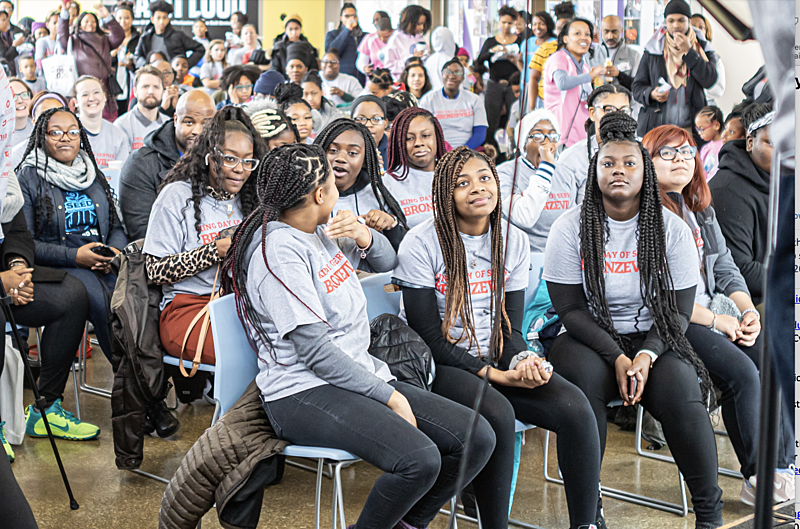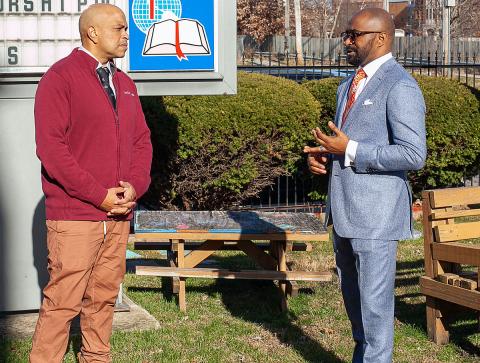Chicago Center for Youth Violence Prevention collaborates with the Greater Bronzeville community to reduce violence and address critical needs elevated through community planning process

Disinvestment, poverty, educational disparities, and health inequities caused by systemic racism have taken a heavy toll on the Chicago communities that are disproportionately affected by violence. The Chicago Center for Youth Violence Prevention (CCYVP), based at the UChicago Crown Family School of Social Work, Policy, and Practice, is collaborating closely with the Bronzeville nonprofit Bright Star Community Outreach to take on this multifaceted issue. Together, they’re demonstrating how a committed academic-community partnership can make real impact in a community.
Findings from the CCYVP’s research in partnership with BSCO are expected to be released in the coming weeks.
Building trust
The work of BSCO can be traced back to 2009, when a neighborhood resident approached Pastor Chris Harris of Bright Star Church worried that her grandson would be caught up in street violence.
“Reverend,” she said, “I need you to pray for my grandson, but you know we need more than prayer around here. We need programs.”
As a lifelong resident of Bronzeville and a pastor for more than twenty years, Harris has seen up close the destructive impact that decisions like public school closings and demolition of public housing units have had on the community. In his view, this kind of structural violence — discriminatory policies and practices that block communities of color from equal access to economic, social, and political resources — has contributed to the neighborhood’s declining Black population, the dwindling of already scarce supports, and high rates of community violence.
Seeing his community’s trauma and hearing from neighbors like the concerned grandmother inspired Harris to start an after-school program for Bronzeville youth. The program grew into BSCO, which now employs 450 full-time and part-time staff members and offers a slate of resources that range from mental health counseling to workforce development to parenting education — all centered on reducing violence and countering its effects. Inspired by the work of NATAL in Israel, BSCO uses trained faith leaders and mental health professionals as trauma counselors to provide counseling services through a helpline and community ambassadors. More than 44,000 people have received services through the helpline, C.A.R.E. Room and outreach efforts.

BSCO is also a hub for convening community partners to create solutions around violence prevention and the health and well-being of community residents.
“We provide trauma counseling and services for victims of violence,” Harris said, “but we also want to prevent youth and families from needing that trauma counseling in the first place. How can we put programs in place to prevent kids from being victims or perpetrators of violence?”
The CCYVP has become BSCO’s trusted partner in answering that question.
As one of five national Academic Centers of Excellence for Youth Violence Prevention funded by the Centers for Disease Control and Prevention, the CCYVP studies the causes and consequences of youth violence and uses the data to partner with community stakeholders to create, implement, and test programs and policies.
One of Bright Star’s grounding principles is that nothing should happen in a community without the community’s input: “Nothing about us, without us,” is a mantra for Harris. According to Pastor Harris, the CCYVP team’s ongoing presence with these Bronzeville partners has created a relationship that transcends usual collaborations. “There is a long history of communities being research subjects without seeing community benefits, so many residents distrust researchers and academic institutions. Building trusted partnership requires time – sharing spaces, developing a shared language, and being present for big and small projects,” said Franklin Cosey-Gay, executive director of the CCYVP.
Creating a comprehensive plan
Together, Bright Star and the CCYVP are working to reduce violence rates in Greater Bronzeville, where more than a third of residents live in poverty, and the overall violent crime rate is twice the Chicago average. Central to their work is engaging community partners to gather and use data to inform the community’s selection of a set of priority issues, identify existing resources and gaps to addressing those priorities, and then implementing and testing programs and policies aimed at those issues. This partnership has brought more than 60 community organizations to the table to develop a Community Action Plan.
“The plan provides a roadmap for the work,” said Deborah Gorman-Smith, dean and Emily Klein Gidwitz Professor of the Crown Family School, and principal investigator and director of the CCYVP. “While the initial intent had been to reduce violence, through the use of data, it became clear that there were a set of interrelated issues to be addressed and a singular focus on violence alone was not likely to bring community-level change. The plan and current efforts are now focused in four core areas: youth and family violence prevention, education equity, trauma informed care and work-force development.”
Having a plan also helps to direct and obtain additional resources. For example, the MacArthur Foundation awarded BSCO $1,000,000 to be used to support the implementation of programs to address the goals related to education equity outlined in the community action plan.
“The overall goal is to create change over time,” explained Nichole Carter, BSCO’s chief program officer. “The data help us come up with programs that mitigate risk factors or strengthen protective factors against violence, and also help us evaluate how well they work.”
For example, missing even a small number of school days is a risk factor for students’ dropping out of high school and becoming involved with the juvenile justice system. When BSCO convened community partners to help choose evidence-based programs for Bronzeville, guided by data about absenteeism, they chose to implement the Check & Connect program in local schools.
If a student is often absent or otherwise disengaged with school, Check & Connect pairs them with a mentor who checks in weekly for a conversation about feelings, thoughts, and behaviors, and works with them to increase their confidence and problem-solving skills.
Mentors also connect students and families with resources that help strengthen academic achievement and their overall sense of belonging. The research team will use follow-up surveys and public data to evaluate the program’s effect on truancy, school completion, and youth violence in Bronzeville.
Relationships form a strong foundation
Effective program implementation and evaluation depend on the community’s willingness to engage. “We have an 80% response rate to our surveys, which speaks to Pastor Harris’s leadership and the trust we’ve built in the community,” Carter said. Harris says that residents are willing to participate “not only because they trust the Bright Star brand, but also because they trust the researchers now,” thanks to the CCYVP team’s commitment to the community as demonstrated through their regular presence at community meetings and events.
“We've built a family out of folks who focus on science and folks who do community work,” he said. “We've built trust, we've made the community trust us, and that is a huge deal because there is no research you can do without a relationship first. So, we've built a relationship that welcomes research. I think you will see the results in the end.”
Bronzeville community members have also gotten to know the CCYVP through its work to support community-based organizations, schools, and other stakeholders in effective ways to implement and evaluate programs.
For example, CCYVP team members teach community partners how to access and use public crime data, share effective strategies for writing grant proposals, and hold workshops on implementing programs and evaluating their effectiveness. Helping organizations strengthen and grow their programs helps them gain financial support to expand their reach, said Harris: “Dollars follow data, money follows metrics, and expansion follows evaluation.”
The CCYVP also helps community partners align their approaches for maximum impact. “Our ultimate goal is not only to help strengthen the capacity of organizations convened by BSCO, but also to strengthen the capacity of partners to work as a coalition,” said Cosey-Gay. “We strongly believe that it will take a coordinated and comprehensive approach to buffer against the structural challenges that communities like Bronzeville face.”